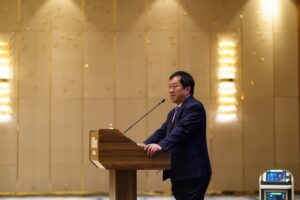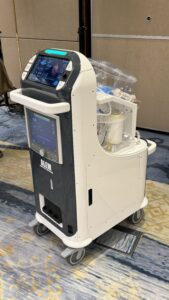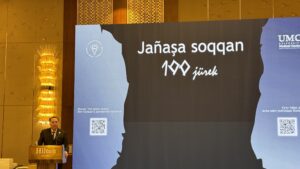ASTANA — Kazakhstan recently celebrated its 100th heart transplant, coinciding with the completion of a domestically developed device that extends the storage time of donor hearts and other organs beyond 24 hours. Yuriy Pya, renowned cardiac surgeon and CEO of the University Medical Center (UMC), announced this during a Feb. 27 forum dedicated to this achievement.

Yuriy Pya. Photo credit: UMC
The device, symbolically named Alem (meaning “world”), enables the transport of donor organs across Kazakhstan. Pya noted that its development was spurred by an incident in which a plane carrying a donor organ could not land due to weather conditions. The plane was forced to fly to the nearest airport before arriving back in Almaty, far beyond the critical four-hour window for organ viability.
“For five years, we have been developing this system, and now we have completed the experimental phase and animal trials. We are in the process of obtaining clinical approval and hope to begin using it after April,” Pya said, adding that a plant for the mass production of the device is planned to be built in Astana.
The 100th heart transplant recipient, a 53-year-old man with chronic heart failure, had relied on a mechanical heart support device for four years while awaiting surgery. Though unable to attend the forum, he has since been discharged and is recovering at home.

Alem device. Photo credit: The Astana Times
Among those present was Zhanibek Uspanov, Kazakhstan’s first heart transplant recipient. Thirteen years ago, at the age of 38, he received a donor heart after complications from a common throat infection led to severe cardiac failure. Today, he leads an active lifestyle and dismisses myths about organ transplants carrying emotional imprints.
“I never felt a sense of foreignness, except in the first days when my pulse jumped from 45-50 beats per minute to 90-100. That was very strongly felt because it was healthy and gave a pulse that a normal person should have. Well, over time, I got used to it,” he shared.
Uspanov particularly highlighted the role of Igor Vorotnikov, the son of Kazakhstan’s first posthumous organ donor, whose decision to allow his mother’s heart to be transplanted was a turning point for the country’s transplant program.
“If he hadn’t given permission back then, I don’t know where we would be now,” Uspanov said. Now the head of the Public Association of Transplanted Patients, he advocates for the development of organ transplantation in Kazakhstan.

Aidar Sitkazinov. Photo credit: The Astana Times
Meanwhile, Aidar Sitkazinov, the director of the National Center for Coordination of Transplantation, stressed the need to build public trust in posthumous donation. Of the 260 organ transplants performed in 2024, only 23 involved posthumous donors, and only ten out of 86 families consented to posthumous donation.
Currently, 142 patients, including five children, are waiting for a donor heart. The overall transplant waiting list includes more than 4,000 patients, with over 3,700 needing kidneys and 190 awaiting liver transplants. Doctors emphasize that up to 300 cases of brain death with a “living” heart occur every year, meaning more patients could be saved if families agreed to donation.
